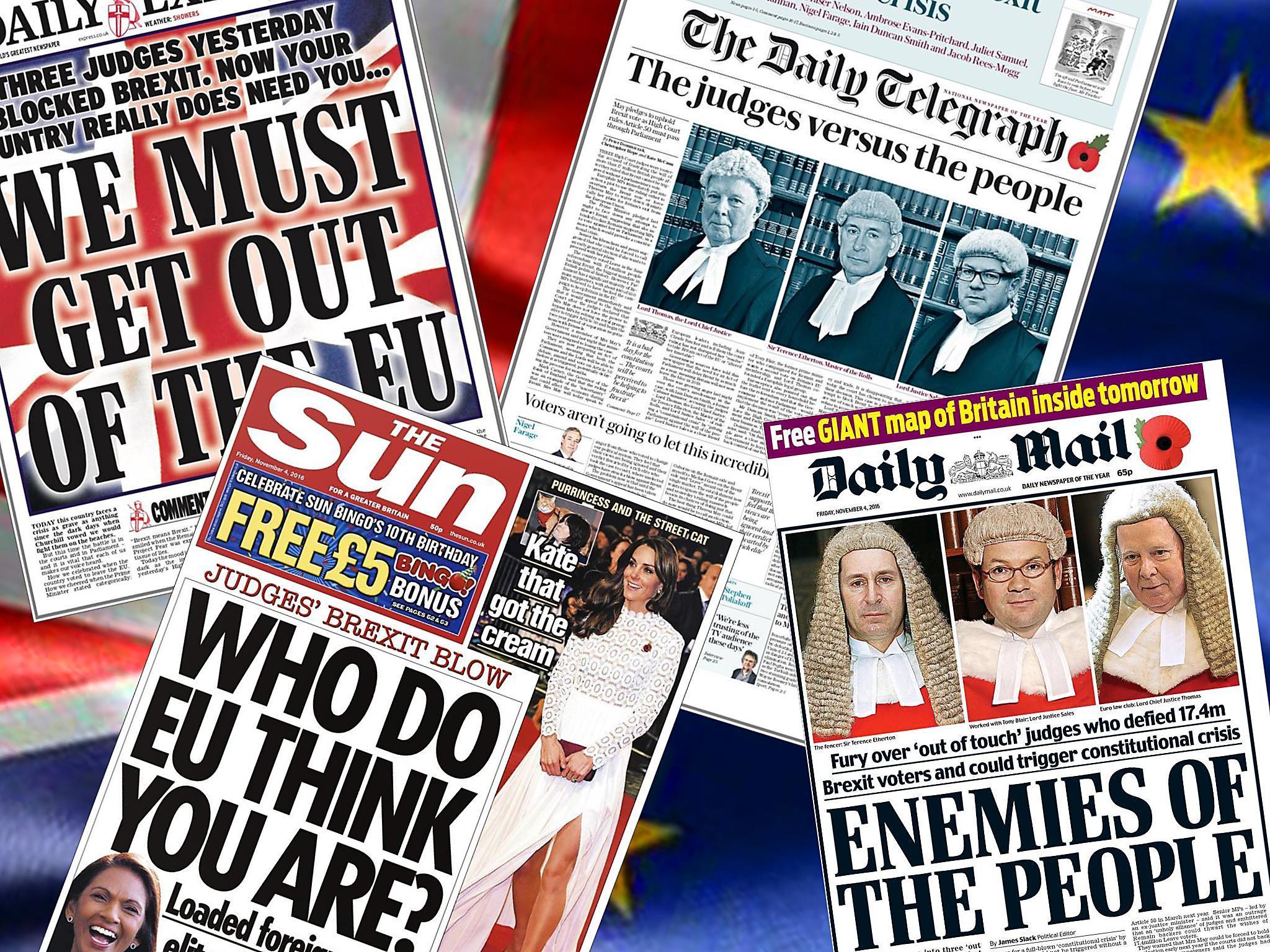By branding High Court judges ‘enemies of the people’, the pro-Brexit media proved it’s finally lost touch with reality
To compare the defence of this country against the Nazis to a new battle against the ‘injustice’ of a court ruling gets about as close as you can to encouraging mob rule without actually doing so. Has it really come to that?


Your support helps us to tell the story
From reproductive rights to climate change to Big Tech, The Independent is on the ground when the story is developing. Whether it's investigating the financials of Elon Musk's pro-Trump PAC or producing our latest documentary, 'The A Word', which shines a light on the American women fighting for reproductive rights, we know how important it is to parse out the facts from the messaging.
At such a critical moment in US history, we need reporters on the ground. Your donation allows us to keep sending journalists to speak to both sides of the story.
The Independent is trusted by Americans across the entire political spectrum. And unlike many other quality news outlets, we choose not to lock Americans out of our reporting and analysis with paywalls. We believe quality journalism should be available to everyone, paid for by those who can afford it.
Your support makes all the difference.Just when you thought Brexit-based hysteria couldn’t get any more bonkers, along comes a perfectly well-argued legal decision and the more ardent Leavers go into complete and utter meltdown, with the front pages of Brexit-supporting newspapers in the vanguard.
The Telegraph plumped for “The judges versus the people”, which turned out to be only a short hop away from the Daily Mail’s “Enemies of the people” (featuring pictures of the judges below). While The Sun’s ire was aimed more towards those who had brought the legal challenge which led to yesterday’s ruling (“Who do EU think you are? Loaded foreign elite defy will of Brit voters”), the Daily Express did not hold fire against the judges either, those who had “blocked Brexit”, apparently as part of some elitist plot. The High Court’s judgment was said to have left Britain facing “a crisis as grave as anything since the dark days when Churchill vowed we would fight them on the beaches”. The Express is described as “the world’s greatest newspaper” on its masthead; “most hyperbolic” would be less questionable.
Critics of yesterday’s ruling are as one in their opinion: it has created a constitutional crisis of epic proportions. In fact, nothing could be further from the truth. The judgment underlined the primacy of Parliament in dealing with Britain’s domestic affairs, confirming that governments cannot simply use prerogative powers to push through changes which would affect the rights of every man, woman and child in the UK.
It also highlighted the vital independence of the judiciary from both executive and legislature. For heaven’s sake, it is precisely this separation of powers on which Britain’s great democracy is founded – and it can be traced all the way back to Magna Carta, that treaty beloved of anyone who has ever railed against an overbearing EU.
As such, the thing most likely to cause a constitutional crisis is the claim that we are already facing one simply by virtue of yesterday’s judgment. After all, to express outrage – as some have done – at the judges being “unelected”; and to call them “arrogant” because they reached their conclusion on the basis of the law (rather than by simply looking at the outcome of a yes/no referendum) is only a few steps short of arguing for the effective dissolution of Britain’s constitution. To compare the defence of this country against the Nazis to a new battle against the “injustice” of a court ruling gets about as close as you can to encouraging mob rule without actually doing so. Has it really come to that?
It is abundantly clear that the judgment handed down by the court yesterday is not a “block” on Brexit – a temporary brake perhaps, but manifestly not a block. It must also be inconceivable that Parliament would refuse to grant permission for the Government to trigger Article 50: many MPs did not agree with the referendum’s outcome but few would seek to challenge its validity. To argue – as the Express appears to today – that the “Westminster cabal” cannot be trusted simply to debate the finer points of what Brexit might look like is to fuel the anti-elites narrative which is firing hateful politics from the UK to the US, and across Europe.
In the immediate aftermath of the referendum, amid the joy and the despair, many sensible heads – including commentators across the media spectrum – called for the two sides to work together in order to make the best of a life outside the EU. The media itself can have a role to play in healing the divisions left by the Brexit vote. But today’s frenzied front pages suggest instead that sections of the press are more concerned with realising the dreams of the most rabid Brexiteers than acting in the national interest, even if that means dismantling the bulwarks of British democracy in the process.
Join our commenting forum
Join thought-provoking conversations, follow other Independent readers and see their replies
Comments